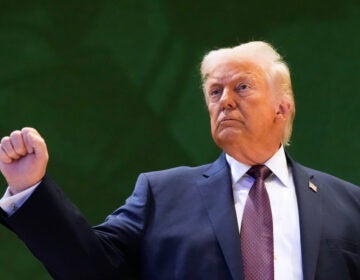In N.J. Senate race, Bell banks on a return to the gold standard
Listen
Republican Senate candidate Jeff Bell (center) addresses a gathering during an event in Marlton, N.J. Bell faces Democratic Sen. Cory Booker Nov. 4. New Jersey has not elected a Republican to the U.S. Senate since 1972, but conservatives think they have a chance with Bell, a little-known candidate taking on the well-funded Booker. (Mel Evans/AP Photo)
Although it’s been decades since the U.S. used gold to back its money, the idea of a gold standard has always been a hot topic in American politics.
You might remember William Jennings Bryan’s “Cross of Gold” speech from history class. And you almost definitely know the film “The Wizard of Oz,” which has long been considered an allegory for the gold debate in the U.S.
President Richard Nixon officially cut ties with the gold standard in 1971, but the idea has been making a comeback in the last few years.
A growing number of conservative politicians and activists have been putting their weight behind an outright return to the gold standard. And in New Jersey, a candidate for U.S. Senate is placing the idea at the top of his platform.
“The thing that particularly interests me is to get an issue that isn’t being talked about on the national menu, or the state menu at the very least,” said Jeff Bell, the Republican nominee challenging Sen. Cory Booker of New Jersey. “That’s what I’m trying to do with my support for the gold standard.”
Bell, who worked for Ronald Reagan’s presidential campaign, is best known for defeating Sen. Clifford Case in the GOP primary in 1978, only to lose to Democrat Bill Bradley in the fall.
“The best thing about the gold standard is its predictability,” said Bell. “If your money is going to retain its value a year from now, five years from now, 10 years from now, even 100 years from now, which is the track record of the gold standard, that helps the little guy.”
Under the current system, the Federal Reserve prints and issues money based on the full faith and credit of the government. The dollar isn’t backed by any material resource, so its value can fluctuate.
Advocates say tying the dollar to gold would stabilize its value, keeping inflation in check and helping the average person afford a little bit more.
Many economists agree that the gold standard isn’t necessary right now because inflation isn’t currently a problem. But Bell says that viewpoint is out of touch.
“For the little guy, the worker, when he’s told that the price of living isn’t going up, he will laugh in your face. Believe me, I’ve talked about this, and nobody thinks the price of living is stable.”
Tea party support
Lately, some of the “little guys” have been listening to Bell’s message.
At a recent meeting of the West Jersey Tea Party in Medford, New Jersey, residents worried aloud about the economy and voiced support for the gold standard.
“Look at what’s happened in the last 40 years, look at the value of the dollar, look at the purchasing power, look at what I can buy,” said Roger Hare. “There needs to be something to back the monetary system.”
Sean Moran, 22, agreed that bringing back the gold standard would shore up the economy for the future. “If you want to maintain your savings and your wages, and not just lose money over time, and keep a stable economy, you need to make sure there’s a gold standard,” he said.
The idea’s most popular proponent might be former Congressman Ron Paul, the Texas Republican. His support for the gold standard thrust the idea into mainstream tea party thought and helped earn it a mention in the official GOP platform adopted at the Republican National Convention in 2012.
“There’s this sense [among Tea Party supporters] that when the government manipulates monetary policy … it is somehow confiscating money from them,” said Kate Zernike, New York Times reporter and author of “Boiling Mad: Inside Tea Party America.”
She says tea party conservatives distrustful of the government see bringing back the gold standard as a way to make the economy fair again. Instead of letting the Federal Reserve print money when it sees fit, the gold standard would force the government to tie the number of dollars issued to a fixed stock of gold.
“It’s this very emotional reaction where people think, ‘Why is some government entity just inventing money?’ It makes them feel out of control. And they think, ‘This can’t be the right thing to do.'”
Does a gold dollar make economic sense?
The gold standard’s popularity among tea party supporters hasn’t translated into mainstream support.
“You would not find a single serious economist in favor of the gold standard today. It is not a good plan,” said Dr. Michael Bordo, economics professor at Rutgers University.
Bordo points out that digging up, minting, and storing a fixed stock of gold would carry a hefty price tag for the U.S. Another problem, he says, is that a gold standard prevents the Federal Reserve from being able to print money when the economy slides, an option it didn’t have when it wanted to stimulate the economy during the Great Depression.
Just because today’s economy might be more confusing to the average person than it has been in the past, that’s not necessarily a bad thing, he said.
“Going back to the gold standard is like going back to the economy of the pre-World War I when we depended on railroads,” he said. “We’ve improved the economy. Paper money is a great improvement upon what we had 100 years ago.”
It also isn’t clear if Bell’s strategy is winning over independents or undecided voters.
According to a recent Monmouth University poll, only 17 percent of registered voters said they were very familiar with what the gold standard actually means. And 42 percent said they didn’t know at all.
Meanwhile, Bell is trailing Booker in both name recognition and financial support.
But Bell understands the odds, and says Garden State voters have responded well to controversial ideas in the past.
“I came back to New Jersey, a state which when I ran on the Reagan tax cut in ’78, was totally open to ideas outside the box, ideas not accepted by the economics profession, which is the way with the gold standard now.”
If he prevails at the polls, Bell would be the first Republican to win a U.S. Senate seat in New Jersey since 1972.
WHYY is your source for fact-based, in-depth journalism and information. As a nonprofit organization, we rely on financial support from readers like you. Please give today.




